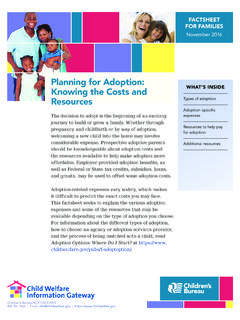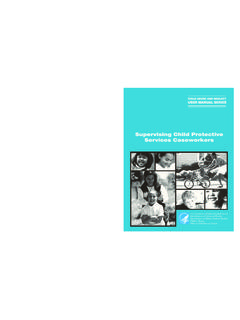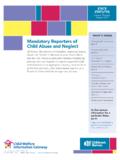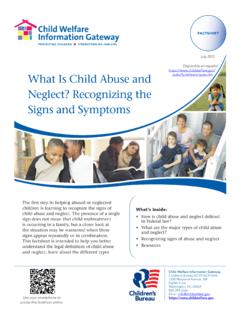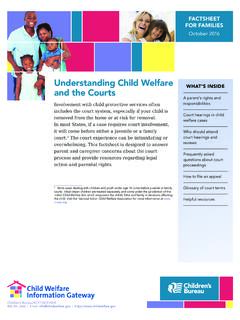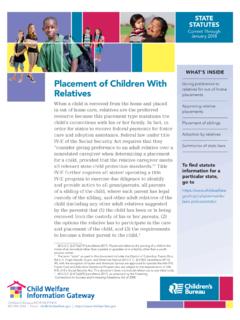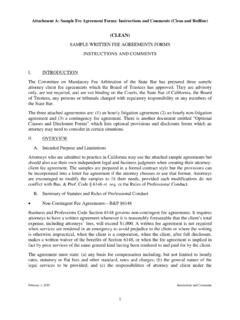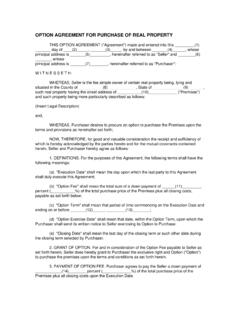Transcription of Kinship Guardianship as a Permanency Option - Child Welfare
1 Children s Bureau/ACYF/ | Email: | STATUTESC urrent Through July 2018 WHAT S INSIDEP urpose of guardianshipA guardian s rights and responsibilitiesQualifying the guardianProcedures for establishing guardianshipContents of a Guardianship orderModification or revocation of guardianshipKinship Guardianship assistanceSummaries of State lawsTo find statute information for a particular State, go to Guardianship as a Permanency OptionLegal Guardianship is a judicially created relationship between a Child and responsible adult in which the guardian assumes many of the rights and responsibilities that customarily would reside with the Child s parents. Traditionally, a guardian has been a person, usually a relative or close family friend, who has been named by the parent in his or her will to assume the care of the Child after the parent s death or permanent disability. In addition to parental arrangements for Guardianship , a court may appoint a guardian for a minor if the parent is unable or unwilling to provide appropriate care for his or her Child or parental rights have been court also may appoint a relative or other kin as a permanent guardian when that person has been caring for the Child as a foster parent.
2 Kinship Guardianship can be a Permanency Option for a Child in the legal custody of a department of social services when reunification with the Child s parents or Permanency through adoption is not feasible. Guardianship creates a legal relationship between a Child and caregiver that is intended to be permanent and self-sustaining and can provide a permanent family for the Child without the necessity of terminating parental of GuardianshipPermanent Guardianship with a relative caregiver can provide a permanent home for a Child in out-of-home care when efforts to reunite the Child with his or her family have been unsuccessful and Permanency through adoption is either not possible or not appropriate. For this publication, laws and policies were collected from all States, the District of Columbia, American Samoa, Guam, the Northern Mariana Islands, Puerto Rico, and the Virgin Islands. An analysis of the information collected indicates that approximately 45 States, the District of Columbia, Guam, and the Virgin Islands specifically provide in statute, regulation, or policy for Guardianship with kin as a Permanency Option for children in out-of-home Since Guardianship usually does not require termination of parental rights, the Child is able to maintain family connections while gaining the stability of a permanent home with a relative caregiver who has demonstrated a commitment to caring for the Child throughout the Child s minority.
3 Guardianship can be particularly suited to the Permanency needs of an older Child under the following circumstances: The Child has been in a stable placement with thecaregiver for a period of time. The Child is unwilling to be adopted. Parental rights cannot be terminated. The Child continues to benefit from the relationshipwith the birth family. The caregiver is able and willing to provide apermanent home for the Child but is unwilling orunable to adopt the The word approximately is used to stress the fact that States frequently amend their laws. This information is current through July 2018. The States that provide for Guardianship with kin include Alabama, Alaska, Arizona, Arkansas, California, Colorado, Connecticut, Delaware, Florida, Georgia, Hawaii, Idaho, Illinois, Iowa, Kansas, Louisiana, Maine, Maryland, Massachusetts, Minnesota, Mississippi, Missouri, Montana, Nebraska, Nevada, New Jersey, New Mexico, New York, North Carolina, North Dakota, Ohio, Oklahoma, Oregon, Pennsylvania, Rhode Island, South Dakota, Tennessee, Texas, Utah, Vermont, Virginia, Washington, West Virginia, Wisconsin, and Wyoming.
4 For more information on relative placement, see Child Welfare Information Gateway s Placement of Children With Relatives at A Guardian s Rights and ResponsibilitiesA guardian is granted permanent care, custody, and control of the Child and assumes many of the rights and duties that customarily would reside with the Child s parents. Duties include providing the Child with a safe, stable, and appropriate home; adequate food and clothing; education; and basic health, mental health, and dental care. Rights include the authority to consent to school enrollment and health and mental health services as well as to make decisions on behalf of the many States, the order of Guardianship also will allow the guardian to provide consent for other major life events, such as the following: Marriage (in 25 States, the District of Columbia,American Samoa, Guam, and the Virgin Islands)2 Enlistment in the armed forces (in 18 States, the Districtof Columbia, and American Samoa)3 Major medical treatment, including surgery (in 21 States, the District of Columbia, American Samoa,Guam, and the Virgin Islands)4 Adoption of the Child (in 16 States, American Samoa,Guam, and the Virgin Islands)
5 52 Alaska, Arizona, Colorado, Connecticut, Delaware, Idaho, Illinois, Indiana, Iowa, Louisiana, Maine, Massachusetts, Michigan, Montana, New Hampshire, North Carolina, Oregon, Pennsylvania, South Carolina, Tennessee, Texas, Utah, Vermont, Virginia, and Wisconsin3 Alaska, Connecticut, Delaware, Idaho, Illinois, Iowa, Louisiana, New Hampshire, North Carolina, Oregon, Pennsylvania, South Carolina, Tennessee, Texas, Utah, Vermont, Virginia, and Wisconsin4 Alaska, Arkansas, Connecticut, Delaware, Idaho, Illinois, Indiana, Iowa, Kansas, Louisiana, Maine, Massachusetts, New Hampshire, North Carolina, Oregon, South Carolina, Texas, Utah, Virginia, Wisconsin, and Wyoming5 A guardian may consent to the Child s adoption in Arizona, Georgia, Indiana, Iowa, Massachusetts, Michigan, Montana, New Hampshire, New York, and Oregon. In Illinois, Maine, and the Virgin Islands, a guardian may consent to the Child s adoption only when the court expressly authorizes the guardian to provide consent.
6 In Colorado, Idaho, North Dakota, Texas, and American Samoa, the guardian may consent to the Child s adoption only when parental rights have been Guardianship as a Permanency Option2 This material may be freely reproduced and distributed. However, when doing so, please credit Child Welfare Information Gateway. This publication is available online at Guardianship as a Permanency Option3234567891048 678 6 16 011 601 0 1 68 6 45904 91 6 1 10 6 31 6 4 65 6 18516 01 496 34 6 1 8016 07894 6 891 8 623456 4 894 64568 84 8 16 4 16896399 5 34 1 801 9 4 5 5 5917 4 1 8 5 4 415 5989 915 4 534 80 48 534 Procedures for Establishing GuardianshipTo establish a Guardianship , a petition is filed with the court that has jurisdiction over the Child s case by a parent, the State or county Child Welfare agency that has legal custody of the Child , the prospective guardian, the Child or his or her legal representative, or any other person with a legitimate interest in the case.
7 The court will then schedule a hearing to review the the hearing, the court will determine whether the proposed Guardianship placement will provide the Child with a suitable permanent home. The factors that go into that determination include the following: The home study shows that the prospective guardian s home is safe and can appropriately meet the Child s needs. The results of criminal records and Child abuse and neglect registry checks of the prospective guardian and all adult members of the prospective guardian s household reveal nothing that would pose a threat to the Child s safety. The Child is comfortable with the prospective guardian and members of the prospective guardian s household. The prospective guardian understands the permanent nature of a Guardianship and has expressed a strong commitment to caring for the Child throughout the Child s minority. The Child has been consulted regarding the Guardianship and is in agreement with the Guardianship the court has determined that the prospective guardian s home is suitable for the Child and that the placement will serve the Child s best interests, it will appoint the person as the Child s Laws in 32 States, the District of Columbia, Guam, and the Virgin Islands specify the age at which the Child may nominate his or her guardian and must agree to the Guardianship placement.
8 The Child must be allowed to state his or her preference at age 14 in Alabama, Alaska, Arkansas, Delaware, Georgia, Hawaii, Illinois, Indiana, Iowa, Maine, Minnesota, Missouri, Nevada, New Hampshire, New Mexico, New York, North Dakota, Oregon, Rhode Island, Utah, Washington, Wyoming, the District of Columbia, and the Virgin Islands; at age 12 in Arizona, California, Colorado, Connecticut, Mississippi, Montana, New Jersey, Tennessee, Wisconsin, and Guam; and at age 10 in the GuardianGuardianship will be considered as a permanent placement for the Child only after the Child has been living in the home of the prospective guardian for a period of time (usually 6 months), and the placement has been appropriate and stable. Guardianship homes generally must meet the same standards of any relative foster placement, including the completion of a home study that includes checks of State and Federal criminal records and Child abuse and neglect registries.
9 The study also includes a home inspection to ensure that the prospective guardian can provide the Child with a safe and adequate home Guardianship is intended to be a permanent placement, a Guardianship home study also shall determine whether the following conditions have been met: The Child demonstrates a strong attachment to the prospective guardian, and the guardian has a strong commitment to caring permanently for the Child . The prospective guardian is willing to provide a safe and permanent home for the Child . The prospective guardian has demonstrated the ability to provide for the Child s physical, mental, emotional, educational, and psychological needs without ongoing supervision of the Child by the State Child Welfare agency, except for provision of assistance. The prospective guardian has established a nurturing, stable relationship with the Child or (for a very young Child ) the Child s family, and the Child indicates, through words or nonverbal actions, a desire to continue a family relationship and residence with the guardian in the guardian s household.
10 To the extent feasible, the Child has been consulted regarding the Guardianship . Permanent placement with a guardian is in the best interests of the For more information on the home study process, see Information Gateway s Home Study Requirements for Prospective Foster Parents at Guardianship as a Permanency Option4234567891048 678 6 16 011 601 0 1 68 6 45904 91 6 1 10 6 31 6 4 65 6 18516 01 496 34 6 1 8016 07894 6 891 8 623456 4 894 64568 84 8 16 4 16896399 5 34 1 801 9 4 5 5 5917 4 1 8 5 4 415 5989 915 4 534 80 48 534 The Child s parents present evidence showing that the circumstances that led to the Child s removal from their home have been sufficiently corrected and that they can resume custody of the Child . The parents wish to modify the terms of contact or visiting time in the original Guardianship the Guardianship is revoked, the court can appoint a successor guardian, return the Child to the Child s parents, or transfer custody of the Child to the State or county Child Welfare agency.
